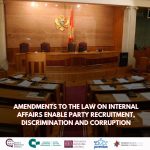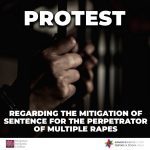16/05/2010 On the occasion of passing the first instance verdict to six men accused of war crimes against prisoners in the Morinj camp
16/05/201018/05/2010 Inefficient protection of civil servants reporting corruption in Montenegro – ’’whistleblowers’’ – the case of Mirjana Draskovic
18/05/201017/05/2010 On the occasion of the International Day Against Homophobia and Transphobia
On this date, twenty years ago, the World Health Organization (WHO) declared that homosexuality is no longer considered a disease. Every year this day is being celebrated as the day against homophobia and transphobia, negative attitudes, such as condemnation, contempt and other forms of hatred and prejudice against homosexual and transsexual individuals, which are usually caused by irrational fear.
The problem with homophobia is the fact that it, unfortunately, leads to mental and physical violence against gay and transsexual people, leaving particularly serious consequences, especially while they are still minors. Homophobia is the cause of discrimination in schools, discrimination at evaluation in university, hiring or giving promotion at work, and exercising other rights that all people must be entitled to irrespective of their sexual orientation or transsexual characteristics. Our research in the group of 30 gay people in Montenegro showed that over half of respondents experienced some form of violence or discrimination that they have not reported because of the fear of homophobic reaction of the authorities.
Nowadays, homophobia is considered to be a phenomenon similar to racism, and persons against whom it is directed are at a particularly difficult position because they usually cannot find comfort even amongst family members, as opposed to the members of ethnic groups or race, who are at least supported by their relatives.
Human Rights Action reminds that the research we conducted in October 2009 showed an upsetting level of homophobia and ignorance of Montenegrin citizens regarding the fact that homosexuality is not a disease (71% of population at the time said that homosexuality is a disease, and 58% expected the state to suppress homosexuality).
Unfortunately, unlike the ministers of human rights from other European countries, who were the first to advocate suppression of homophobia, Montenegrin Minister of Human Rights, Mr. Ferhat Dinosa, will be remembered by his statement that homosexuals are undesirable in Montenegro. Thus the Minister of Human Rights showed that he does not honestly believe that human rights apply to all people.
Although 14 NGOs from Montenegro required the Prime Minister to release Mr. Dinosa from duty of the Minister of Human Rights that had not happened to date. Although in October 2009 we wrote to the President of the state, Mr. Filip Vujanovic, urging him to use the power of his authority “to explain to citizens that their children and other citizens of homosexual orientation are not sick and should be respected the same as everyone else” and emphasize “the importance of respecting human and intellectual capacities of each person, rather than indecently and illegally judge their privacy”, we have not noticed that in any of his public speeches he found it appropriate to address the public on this topic.
Obviously the law of political game is still above the exercise of the constitutional ideal of fighting all forms of hatred in Montenegro, including the one towards transsexual people and people of minority sexual orientation.







 English
English